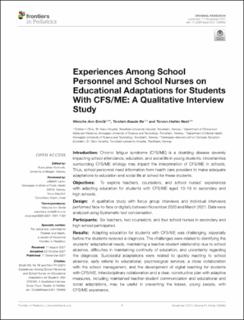| dc.description.abstract | Introduction: Chronic fatigue syndrome (CFS/ME) is a disabling disease severely impacting school attendance, education, and social life in young students. Uncertainties surrounding CFS/ME etiology may impact the interpretation of CFS/ME in schools. Thus, school personnel need information from health care providers to make adequate adaptations to education and social life at school for these students. Objectives: To explore teachers, counselors, and school nurses' experiences with adapting education for students with CFS/ME aged 13–19 in secondary and high schools. Design: A qualitative study with focus group interviews and individual interviews performed face-to-face or digitally between November 2020 and March 2021. Data were analyzed using Systematic text condensation. Participants: Six teachers, two counselors, and four school nurses in secondary and high school participated. Results: Adapting education for students with CFS/ME was challenging, especially before the students received a diagnosis. The challenges were related to identifying the students' adaptational needs, maintaining a teacher-student relationship due to school absence, difficulties in maintaining continuity of education, and uncertainty regarding the diagnosis. Successful adaptations were related to quickly reacting to school absence, early referral to educational, psychological services, a close collaboration with the school management, and the development of digital teaching for students with CFS/ME. Interdisciplinary collaboration and a clear, constructive plan with adaptive measures, including maintained teacher-student communication and educational and social adaptations, may be useful in preventing the losses, young people, with CFS/ME experience. Conclusion: Early interdisciplinary collaboration to adapt education and social life at school for students with CFS/ME, may support teachers, counselors, and school nurses in their efforts to adapt education and prevent losses related to academic and social development in students with CFS/ME. | en_US |

